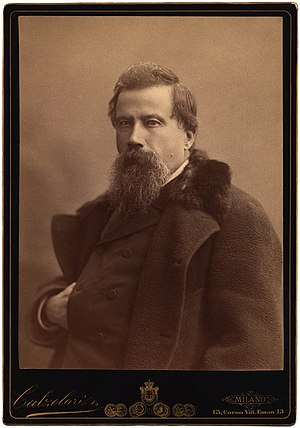Talk:Amilcare Ponchielli
| This article is rated Start-class on Wikipedia's content assessment scale. It is of interest to the following WikiProjects: | ||||||||||||||||||||||||||||
| ||||||||||||||||||||||||||||
Date of Death[edit]
We show him dying on 16 January. Sources seem divided as to whether he died on 16 or 17 January.
- This has a bet each way, referring to both 16 January and 17 January.
On the other hand, Nicolas Slonimsky, usually an extremely reliable source, says he died on 15 January.
So, where to now? Can anyone cite an authoritative reference that will decide this? -- JackofOz (talk) 08:21, 24 January 2008 (UTC)
- 16 January 1886, 11.35 a.m. - source: Giuseppe De Napoli, Amilcare Ponchielli (1834-1886), Cremona Nuova, Cremona 1936, p. 311 --Al Pereira(talk) 20:11, 24 January 2008 (UTC)
Point about I Lituani[edit]
The article on Amilcare Ponchielli said, until I edited it,
The following opera, I Lituani (The Lithuanians) of 1874, was also well received, being performed later at Saint Petersburg (as Aldona on 20 November 1884).
The article on I Lituani said, with sources, until I edited it
After a three-night run in 1903 at La Scala, where the casting was particularly poorly reviewed, I Lituani was not performed again until 1979 when RAI recovered the score."
While performances as Aldona make sense to me, the assertion was entirely unreferenced, and contradicts the Ponchielli article, so I have deleted it (but left it as hidden comment).
Perhaps someone who actually knows the subject can edit both articles to say whether the opera was well or poorly received, include performances as Aldona if that happened, and to explain the renaming. Best wishes, Pol098 (talk) 11:24, 22 April 2021 (UTC)
Featured picture scheduled for POTD[edit]
Hello! This is to let editors know that File:Amilcare Ponchielli (before 1886) - Archivio Storico Ricordi FOTO000794 - Restoration.jpg, a featured picture used in this article, has been selected as the English Wikipedia's picture of the day (POTD) for March 28, 2023. A preview of the POTD is displayed below and can be edited at Template:POTD/2023-03-28. For the greater benefit of readers, any potential improvements or maintenance that could benefit the quality of this article should be done before its scheduled appearance on the Main Page. If you have any concerns, please place a message at Wikipedia talk:Picture of the day. Thank you! --Ahecht (TALK
PAGE) 15:05, 14 March 2023 (UTC)

|
Amilcare Ponchielli (1834–1886) was an Italian composer. Born in Paderno Fasolaro (now Paderno Ponchielli) near Cremona, then Kingdom of Lombardy–Venetia, Ponchielli won a scholarship at the age of nine to study music at the Milan Conservatory, writing his first symphony by the time he was ten years old. He is best known for his operas, most notably La Gioconda, the third and most successful version of which debuted at La Scala in Milan on 28 March 1880. The Dance of the Hours from that opera is widely known thanks in part to its use in Walt Disney's Fantasia in 1940 and in Allan Sherman's novelty song "Hello Muddah, Hello Fadduh". In 1881, Ponchielli was appointed the maestro di cappella of Bergamo Cathedral and a professor of composition at the Milan Conservatory, where his pupils included Giacomo Puccini, Pietro Mascagni, Emilio Pizzi, and Giovanni Tebaldini. He was married to the soprano Teresina Brambilla and died at the age of 51 in Milan. This formal photographic portrait of Ponchielli was taken in Milan and is in the archives of the music publisher Casa Ricordi. Photograph credit: Icilio Calzolari; restored by Adam Cuerden
Recently featured:
|
- Start-Class Opera articles
- WikiProject Opera articles
- Start-Class biography articles
- Start-Class biography (musicians) articles
- Unknown-importance biography (musicians) articles
- Musicians work group articles
- WikiProject Biography articles
- Start-Class Italy articles
- Low-importance Italy articles
- All WikiProject Italy pages




